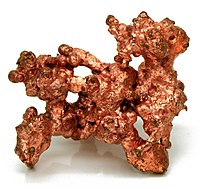
Photo from wikipedia
A total of 2,117 pigs were used in two 35-d growth experiments to determine the effects of increasing added Cu from tri-basic copper chloride (TBCC) or a Cu-methionine chelate (Cu-chelate)… Click to show full abstract
A total of 2,117 pigs were used in two 35-d growth experiments to determine the effects of increasing added Cu from tri-basic copper chloride (TBCC) or a Cu-methionine chelate (Cu-chelate) on nursery pig growth performance. In experiment 1, 1,452 pigs (350 barrows [DNA 200 × 400; initially 5.9 ± 0.17 kg] in group 1 and 1,102 pigs [PIC 1050 × 280; initially 6.0 ± 0.26 kg] in group 2) were weaned at approximately 21 d of age. In experiment 2, 665 pigs (350 barrows, DNA 200 × 400; initially 6.4 ± 0.19 kg, in group 3 and 315 pigs, DNA 241 × 600; initially 5.2 ± 0.49 kg, in group 4) were weaned at approximately 21 d of age. Pigs in groups 1, 2, and 3 were fed a common starter diet for 7 d and pigs in group 4 were fed a common diet for 5 d after weaning before starting experiments. On d 0 of each experiment, pens of pigs were blocked by body weight (BW) and assigned to 1 of 7 dietary treatments. Treatments were arranged as a 2 × 3 factorial plus one control diet, with main effects of Cu source (TBCC vs. Cu-chelate) and level. Copper levels were 50, 100, or 150 mg/kg in experiment 1 and 75, 150, or 225 mg/kg in experiment 2. Diets were corn-soybean meal-based and fed in meal form in two phases (d 0 to 14 and 14 to 35). In experiment 1 from d 0 to 35, there was a Cu source × level interaction (linear, P < 0.05) for average daily gain (ADG) and d 35 BW where the magnitude of improvement with increasing Cu was greater in pigs fed Cu-chelate compared to those fed TBCC. Increasing added Cu increased (linear, P < 0.01) average daily feed intake (ADFI) and gain:feed (G:F). Although Cu source did not influence G:F, pigs fed Cu from Cu-chelate had greater (P ≤ 0.01) ADG and ADFI than those fed Cu from TBCC. In experiment 2, from d 0 to 35, there were no evidence for Cu source × level interactions. Increasing Cu increased (linear, P < 0.05) ADG and final BW. The increase in ADG combined with unaffected ADFI resulted in marginally increased G:F (linear, P = 0.052). In summary, these results suggest that increasing dietary Cu from TBCC or a Cu-chelate improved overall ADG, and d 35 BW in nursery pigs and Cu source has potential to influence nursery pig performance.
Journal Title: Translational animal science
Year Published: 2019
Link to full text (if available)
Share on Social Media: Sign Up to like & get
recommendations!